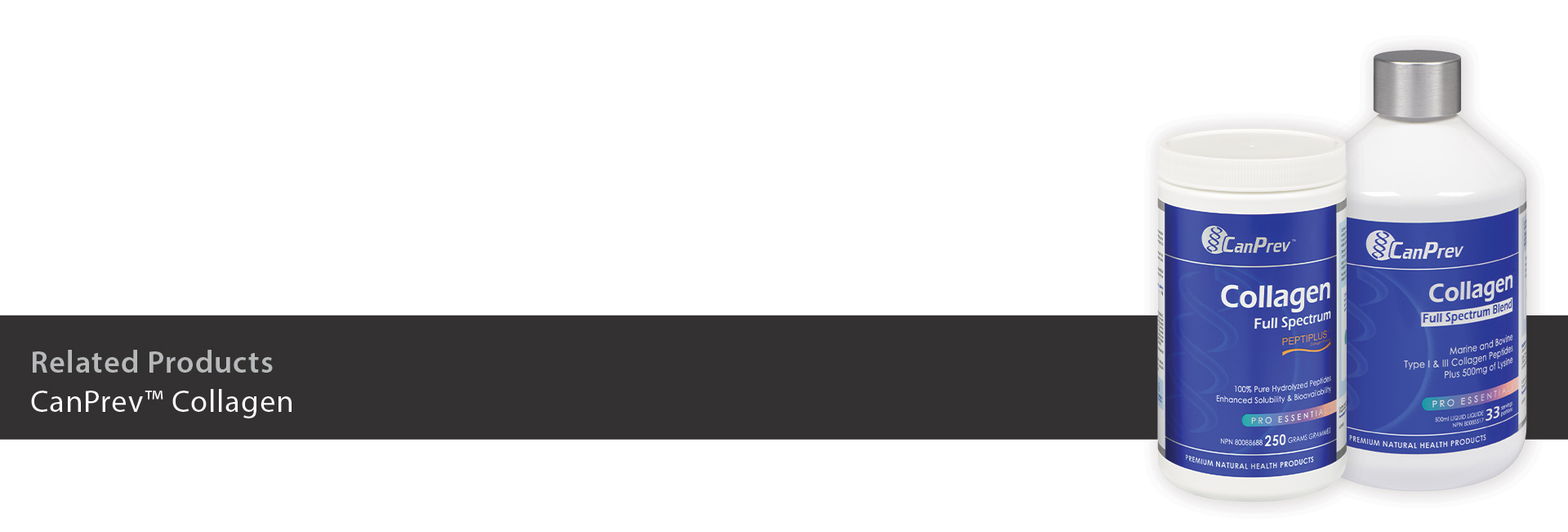Should You Be Taking a Collagen Supplement?
Have your joints been feeling achy lately? Or maybe you’re noticing wrinkles cropping up for the first time. Perhaps your muscles don’t seem as strong as they once were. Not to worry–these are all natural signs of aging. These symptoms are also a sign of naturally decreasing collagen production.
Read on to find out all about what collagen does for our bodies, and how you can be sure you’re getting enough.
Collagen’s Role in The Body
Collagen is the most abundant protein in the body–it’s in your skin, muscles, cartilage, tendons, bones, arteries and even your toenails. Collagen is formed when dietary protein is broken down into amino acids. It keeps our skin flexible and our muscles functional while helping maintain the integrity of our bones, joints and cartilage.
When Collagen Production Slows Down
Collagen is produced naturally in the body, and when we’re younger, our bodies make more collagen than we can break down. But as we age, our body starts to break it down faster than we can make it. Collagen production slows by approximately 1% each year when we reach our mid-twenties, resulting in those familiar signs of aging like joint pain, wrinkles, muscle aches and thinning hair, among others. Aside from aging, factors like exposure to UV rays and pollution, smoking and overexercising can further impact collagen production.
Here’s the good news: taking a collagen supplement can help encourage collagen production in the body and alleviate some of those symptoms.
Choosing a Collagen Supplement
So, you’ve noticed the impact of slowing collagen production. What now? Choosing a collagen supplement can be overwhelming when so many options are available. But we’re here to help you learn what makes a great collagen supplement and how to narrow down your choices.
How To Get Started: When you’re looking for a supplement, be sure to look for collagen peptides. Collagen is made up of three long strands of amino acids–peptides are shorter changes of amino acids, making them easier for the body to absorb.
Size: If you’re looking to target collagen production in specific areas of the body, the size and sequence of the peptides you supplement with are important to consider. Studies have proven that collagen peptides from 2-5 kilodaltons enhance collagen production in the skin, muscles, joints, bones, tendons and ligaments.
Type: In addition to seeing different sizes of collagen peptides lining the shelves of your local health food store, you may also see Type I, II or III on the labels. For collagen peptides, the type isn’t important. After you take your collagen peptide supplement, it gets broken down in your gastrointestinal tract and from that point, the body no longer recognizes what type of protein it is.
Targeted collagen peptides: We’ve learned that lower collagen levels can result in various symptoms in the body–newfound muscle stiffness and joint pain, wrinkles that weren’t there before and early signs of bone loss. CanPrev formulates collagen peptides at precise sizes in specific dosages to target different areas of the body. That way, you can promote collagen production exactly where you need it. Whether you’re looking to strengthen joints, smooth skin or are simply looking for full body support, CanPrev has you covered.
Incorporating Collagen into Your Routine
CanPrev’s collagen peptides are available in powder and liquid form with superior solubility. Both forms can be easily incorporated into hot or cold beverages while remaining highly bioavailable. They can even be used in recipes, like the one you’ll find below.

COLLAGEN COOKIE DOUGH BITES
Incorporating collagen into your everyday life is simple and delicious with these grain-free collagen cookie dough bites!
Ingredients:
1 cup almond flour
¼ cup nut butter of choice
¼ cup semi-sweet chocolate chips
2 tbsp maple syrup
1 tsp vanilla extract
2 tbsp almond milk
3 scoops CanPrev Collagen
Directions:
- Add all ingredients except chocolate chips into a food processor. Blend until combined and the mixture forms a smooth dough-like consistency.
- Using a spatula, fold in chocolate chips. Combine well.
- Portion the mixture into tablespoon quantities and roll into balls. Place the balls on a tray and refrigerate for 1 hour or until set. Enjoy!
Store in an airtight container in the fridge for up to 10 days or freeze for up to a month.
